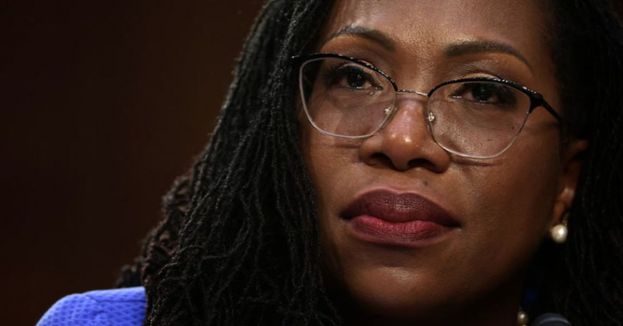Jackson, who was sworn in as the first black woman on the high court last month, said in March that she intended to recuse herself from the previously consolidated lawsuits during her Senate Judiciary Committee hearings due to her role on Harvard's Board of Overseers, which concluded on May 26. But last Friday, the Supreme Court made a procedural step to separate the cases, thereby allowing her to vote on the UNC case.
Federal law states judges must recuse themselves from cases in which their "impartiality might reasonably be questioned," which may include close ties to a political party, a financial interest in the outcome, or participation at an earlier stage of the litigation process.
WATCH: 2004 SNL SKETCH: "DONALD TRUMP’S HOUSE OF WINGS”![]()
While Justices Neil Gorsuch and Elena Kagan and Chief Justice John Roberts all got their law degrees from Harvard, they have not held any recent positions with the university. The court decided to grant review of the two lawsuits on a consolidated basis on Jan. 24, though the latest decision will now see the justices weigh them separately.
WATCH: ESPN HOST- DEMOCRAT STRATEGY IS NOT WORKING![]()
Rita Mkrtchyan, a senior defense attorney and the director of equity alliance at Oak View Law Group, told the Washington Examiner the primary difference between the pair of cases "is that UNC is a state school and is therefore subject to constitutional constraints that Harvard is not."
WELP, CLIMATE WARRIORS HAVE THEIR NEXT TARGET PICKED OUT...![]()
Although Harvard is a private university, it is still asked to follow federal civil rights laws that prohibit discrimination on the basis of the race due to its reception of federal funding.
"By accepting both cases, the court can consider whether the public versus private distinction is a consequential factor for affirmative action," Mkrtchyan said, adding that the order against consolidation allows each case to be argued for one hour rather than a single hour afforded for joint oral arguments for both cases.
When Jackson was nominated by President Joe Biden in February to succeed the now-retired Justice Stephen Breyer, it was clear her appointment would not alter the ideological composition of the 6-3 conservative majority on the high court.
The decision against the consolidation of the cases may have been an effort to "avoid a split 4-4 decision," Mkrtchyan said, though even such an outcome is unlikely given the present ideological imbalance.
TAXPAYER DOLLARS AT WORK: OUTRAGE OVER UC BERKELEY'S TAYLOR SWIFT MARKETING CLASS![]()
And the chances for the high court dismissing affirmative action policies in educational institutions are far greater this time around because the justices who were key to the decisions to uphold affirmative action, Anthony Kennedy and Ruth Bader Ginsburg, were replaced by Justices Brett Kavanaugh and Amy Coney Barrett, both of whom are more likely to disagree with the previous precedent.








 Discover alternative ideas that will make you think
Discover alternative ideas that will make you think Engage in mind bending debate
Engage in mind bending debate Earn points, rise in rank, have fun
Earn points, rise in rank, have fun


